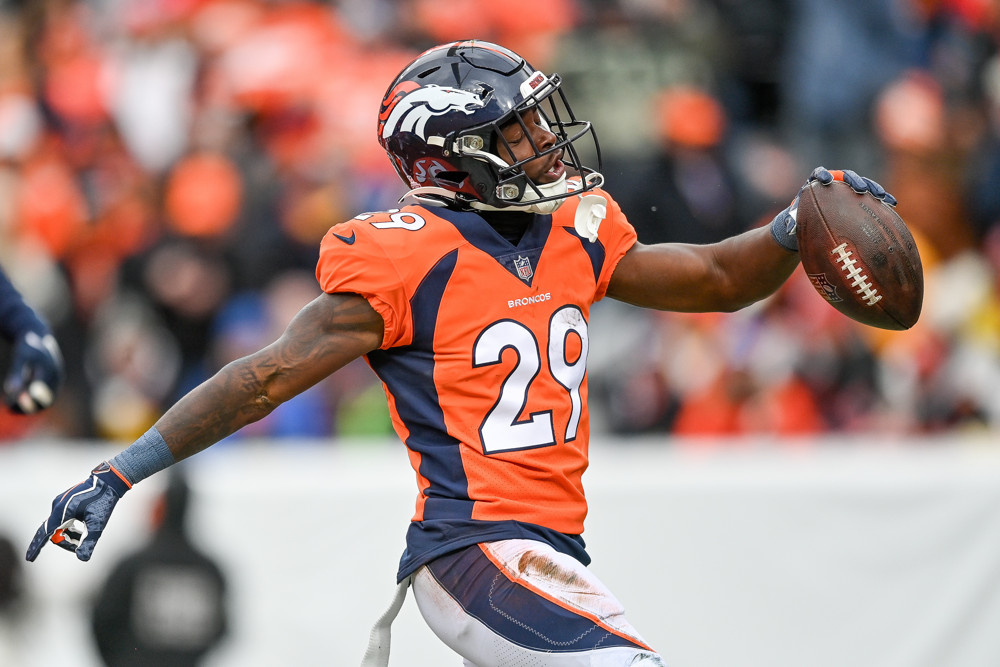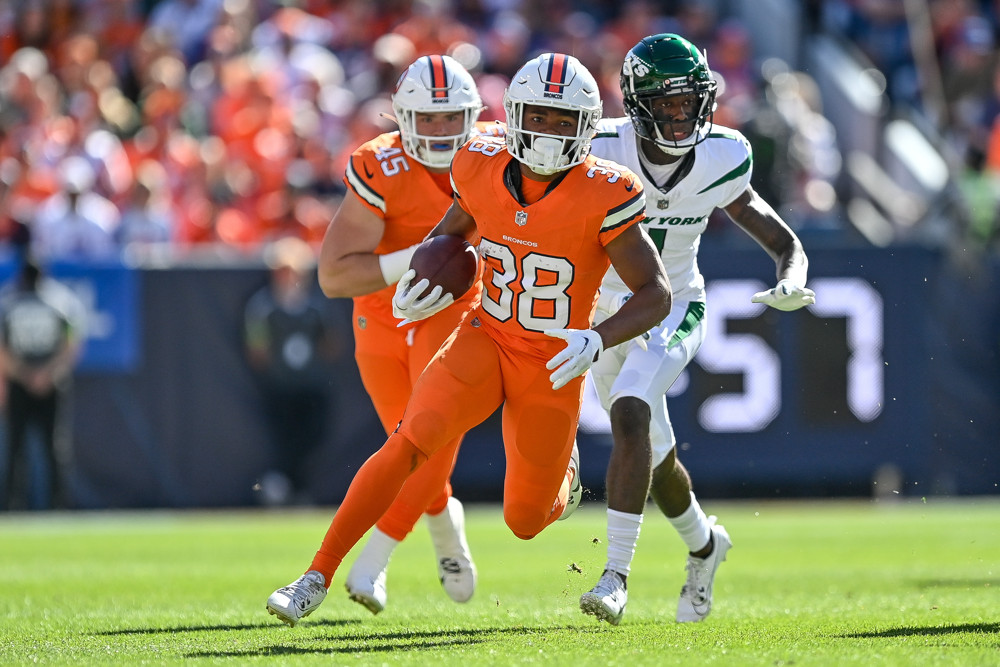
Another Denver Broncos season is in the books, and it’s another Denver Broncos season that failed to meet expectations.
The team is now entering a new era, saddled with several tons of dead cap and no clear answer at quarterback. It’s easy to be pessimistic about the team’s outlook.
Don’t fall prey to that trap though.
Things are brighter than they’ve been in a long time.
Dead cap isn’t fun, but it also isn’t the boogeyman it was made out to be five years ago, as has been demonstrated by teams like the Eagles, Rams, or even this year’s Buccaneers. Meanwhile, the Broncos are better positioned to find and groom their quarterback of the future than they’ve been in a long time, and they just challenged for the playoffs with one of the league’s most talent-deficient rosters.
Better days are just around the bend.
12 months from now, the Denver Broncos will have one of the healthiest salary caps in the league and will likely be positioned to find their quarterback of the future, if they don’t find them this offseason.
With that spirit of heading into the offseason with some optimism, it’s time to highlight some of this year’s most commendable Broncos, and we’re going all out at Let’s Talk Broncos to accomplish that goal.
Most Improved Player
Winner: Ja’Quan McMillian, NCB.
At the start of the season, no one, outside of the most diehard members of the fanbase and a handful of professionals paid to follow the team, knew who Ja’Quan McMillian was.
Now, he’s undeniably one of the very best slot corners in the NFL.
That type of sudden arrival is generally reserved for rookies, not second year players that were forced to spend nearly the entirety of their rookie year on the practice squad.
It wasn’t until midseason that a majority of the fanbase discovered how to pronounce his last name correctly.
McMillian’s sudden ascension was set in motion by one of the lowest points in franchise history – the 70-point bludgeoning at the hands of the Miami Dolphins.
He played zero defensive snaps in that embarrassing defeat. He played six defensive snaps in total through the first three weeks. The very next week, against the Chicago Bears, he played 43 snaps.
From there, McMillian rapidly emerged as a lockdown coverage player with a knack for creating defensive splash plays and takeaways.
His undrafted status was consistently tested by opposing quarterbacks, making him the ninth-most frequently targeted slot corner, yet, in spite of that, he allowed receptions at the ninth-lowest rate among slot corners (min. 100 coverage snaps).
That ability to create takeaways also helped fuel the Denver Broncos’ midseason turnaround.
Over the seven games that made up the Broncos’ 6-1 run, McMillian intercepted two passes, forced two fumbles, recovered two fumbles, two sacks, and four tackles for loss. That’s the type of seven-game stat line a linebacker in an All-Pro race might produce, not a slot corner.
McMillian is different.
Honorable Mentions: P.J. Locke, S & Lloyd Cushenberry III, C.
The rise of McMillian was so dramatic, it’s difficult to go any other direction with the award, but P.J. Locke and Lloyd Cushenberry III also turned in tremendous seasons that are worthy of recognition.
Locke’s 2023 continued a career-long trend for the fourth year safety, where his play took massive leaps and he increased his role exponentially.
His rookie year, Locke had just six defensive snaps, and that climbed to a mere 27 the next season. Last year, he got his first real look on defense, playing 111 snaps, and performed well, but he was still thought of as this team’s No. 4 safety, at best.
At the onset of the season, he was legitimately battling with JL Skinner (more on him briefly) for a roster spot, only to go on to have one of the most impactful seasons of any member of the defense.
In the same sense that McMillian’s nose for the ball was a catalyst for Denver’s defensive turnaround, Locke’s ability to consistently make high-impact plays was another. Starting just eight games, Locke tallied an interception, five pass breakups and two forced fumbles. The craziest note about Locke’s production though is probably the fact that he tallied three sacks, while only being sent on nine blitzes, per ProFootballReference.
With that season, Locke more than earned the contract Denver handed him this past week. Given his track record, it’s frankly hard to imagine him not living up to it.
As did Cushenberry, who went from being one of the league’s most scrutinized centers to being a high-end starter in his fourth season.
In pass protection, he allowed just 14 pressures, the second-fewest among centers with at least 300 snaps. He was also one of nine centers in that same group to allow less that two sacks on the season, and he finished tied for second with Jason Kelce in pass blocking efficiency – a metric that attempts to look at a lineman’s down-to-down stability, while weighting sacks and quarterback hits as more problematic than the basic quarterback hurry.
Among centers with at least 200 snaps in the run game, he finished the season as the eighth-highest graded run blocker on zone scheme runs and the 12th-highest graded run blocker on gap scheme runs.
Hopefully that leap leads to compensatory pick in 2025 for Denver.
Rookie of the Year

Winner: Jaleel McLaughlin, RB.
It’s very difficult to view the Denver Broncos’ ‘Rookie of the Year’ discussion as anything but a two-horse race.
That’s not the result of having two clear standout performers, like last year’s Jets class, which boasted both Sauce Gardner and Garrett Wilson. Instead, it’s the result of extremely limited production from every other member of the rookie class.
Grisly news for a team $80 million over the cap, in desperate need of young talent.
The painfully awkward contrast of having spent so much capital yet having nothing to show for it haunts the entirety of the Broncos’ roster. It’s a juxtaposition rarely seen outside of Vegas’ woebegone washouts, which forces one to ask why this general manager remains at the helm of the operation.
One potential answer? The discovery of a scattered few diamonds in the rough, like this year’s Rookie of the Year winner – Jaleel McLaughlin.
McLaughlin was the second-most utilized weapon in the offense (107 touches), trailing only Javonte Williams; had the fifth-most yards from scrimmage on the team (570 yards); was tied for having the fourth-most touchdowns on the team (three); and finished the season as Denver’s most reliable running back, as he produced a success rate of 53.9% on the ground, good for ninth-best among all running backs.
Having the incredible season McLaughlin just had, as an undrafted free agent, at his stature, at running back, in Denver, is sure to conjure visions of fan-favorite Phillip Lindsay.
Now, it might be sacrilegious to say in the Mile High City, but McLaughlin has the potential to be even better than Denver’s favorite hometown kid.
Despite both being smaller backs, both thrived at creating yards after contact, but McLaughlin has been superior. In his rookie year, McLaughlin averaged 3.38 yards after contact per attempt, the 10th-best rate in the league this year among all running backs with at least 50 carries. In Lindsay’s best season, he averaged 2.92 yards after contact per attempt.
Honorable Mention: Marvin Mims, WR/Returner.
There will surely be protests about McLaughlin beating out Marvin Mims for Rookie of the Year honors, and those protests have a valid case.
Mims earned Pro Bowl and All-Pro honors this year for being one of the league’s most dynamic special teams weapons, he immediately became the Broncos’ best return man since Trindon Holliday, and he showed upside as a legitimate vertical threat.
That said, McLaughlin touched the ball more than three times as often as Mims did, produced 163 more yards from scrimmage, and scored more touchdowns.
That said, at least Mims has a case.
The rest of the class couldn’t even put up a fight.
Drew Sanders showed flashes of good on both special teams and defense, but the hair-pull-worthy mistakes outweighed those flashes. Riley Moss saw the field for a whopping 288 snaps, only 20 of which were on defense, despite the Broncos trading up for him and needing outside cornerback help. Finally, JL Skinner played 10 snaps, despite Denver also needing safety depth, and Alex Forsyth never saw the field.
Coach of the Year

Winner: Christian Parker, DBs Coach.
One of the best ways to measure one’s coaching prowess is to look at the development of players under their purview. With two of the team’s most improved players in his position room, it’s safe to say defensive backs coach Christian Parker is doing an excellent job.
He’s responsible for the development of McMillian and Locke, who both went from undrafted afterthoughts to likely 2024 starters, and also has been in charge of secondary for the entirety of Pat Surtain II’s development.
His work with Fabian Moreau this year is also noteworthy, as he turned an in-season street free agent and proverbial journeyman into a competent starter, at one of the league’s most important and hardest to play positions. Yes, we all remember Week 18 and how ugly that display was from Moreau, but the fact that wasn’t a regular occurrence is a testament to the work of Coach Parker.
But don’t listen to me, or the eye test. That work is reflected in the data.

But hey, numbers lie too. So why not listen to one of the league’s brightest defensive minds – Jerod Mayo, who was just hired to be the NFL’s youngest head coach, despite his defensive background and limited coaching experience. Or maybe Matt LaFleur, whose .675 winning percentage ranks 11th all-time among NFL head coaches. If neither of those impress you, look at the oft-revealed, who ultimately landed Parker.
In 2023, Parker was part of one of the league’s worst statistical defenses, and the governor of a secondary that turned in of the league’s worst statistical performances ever, and yet, was a leading candidate for Mayo and LaFleur’s defensive coordinator positions, before finally taking a DC-in-waiting job with the Eagles, under famed defensive mind Vic Fangio.
He deserves the award.
Hopefully Jim Leonhard will pick up where Parker left off.
Honorable Mentions: Zach Strief, OL Coach & Sean Payton, HC.
Some might argue against the Parker pick, and it’s not overly difficult to see why.
Zach Strief also had a tremendous season on the Broncos coaching staff, and while Parker holds some responsibility for the Miami disaster and the shortcomings with Mathis’ and Moss’ development, Strief’s resume is pretty spotless so far.
His job was also much easier, given the injury luck and recent high-end investments on the line, but the results are hard to argue with.
Garett Bolles and Quinn Meinerz had career years (which will be discussed in more depth in the second installment of our Denver Broncos Season Awards) and Cushenberry had his aforementioned turnaround. Mike McGlinchey was both disappointing, but that’s nothing new for McGlinchey, and Ben Powers was up-and-down, but that’s forgivable considering the undeniable improvements he made elsewhere on the line.
The most important position coach is your offensive line coach. Fortunately for the Denver Broncos, it seems they’ve found a good one.
Now, it’s time for a bit of an aside, as I rant about Sean Payton, and why he deserves to be an honorable mention.
I almost didn’t want to mention Payton here, to avoid the headache of having to argue against so many exhausting narratives, but it’s ultimately too hard not to include him.
Some will view him as the reason for Wilson’s drawbacks this season, but that’s very hard to buy into after seeing the Wilson from 2022, and the Wilson from 2023.
In fact, looking at that contrast, it seems far more likely that Payton came close to maximizing Wilson’s remaining talents, rather than limiting them. If you just want to point at Hackett, and blame his incompetence for the poor 2022 campaign and the subsequent turnaround, you should expand your scope further, look all the way back to 2021 and 2020, and see the exact same truth in regard to the 250 million-dollar man.
Is it really so hard to believe that a quarterback – whose game was predicated on the deep ball and doing to modern NFL professionals what Fran Tarkenton did to plumbers and mailmen – might take a step back with age? Especially when you consider the 2020 defensive revolution that placed a much greater emphasis on removing explosives and downfield throws?
It shouldn’t be.
That’s pretty straightforward.
Back to the point, so long as you believe that Sean Payton wasn’t sabotaging Russell Wilson, producing a middle-of-the-road offense with Denver’s assortment of offensive talent was fairly impressive, much like making a halfway-decent meal on ‘Chopped’.
“Your basket has, the most sack-prone NFL quarterback, who also can’t utilize large swaths of the field; a running back returning from one of the most gruesome knee injuries in recent memory; an undrafted rookie running back; a former first-round pass-catcher that’s a perennial disappointment; a pass-catcher that hasn’t been a difference maker since 2019; oh, and arguably your most-reliable receiver and your most-talented tight end will both be sidelined for the entire season with lower body injuries. You have 20 minutes, starting…now!”
And he pulled it off!
No, it’s not a masterpiece, and skittles and cheese puffs really don’t go together, but what were you expecting given that assortment?
The offense’s mediocrity is also only part of the argument. The fact the Broncos were generally mediocre is a testament to his coaching.
And again, no, mediocrity is not the selling point you want to hear for your high-priced head coach, but sometimes, mediocrity is impressive.
Like Mike Tomlin leading Devlin “Duck” Hodges and Mason Rudolph to winning seasons. Those teams are deeply mediocre, but Tomlin’s coaching performance? Pretty damn impressive.
The 0-3 and 1-5 starts the Broncos experienced this year are far more reflective of this roster’s talent than their 7-4 finish, or even their 8-9 final record. Truly, how many of this team’s position groups are above-average?
Forget elite.
How many aren’t problem areas?
Offensive line, maybe secondary, and that’s it? And this team managed to close the year 7-4, despite seemingly having nothing to play for?
Much like Dan Campbell’s coaching performance with the Lions in 2022, which opened with severe doubt and painful disappointment, yet closed with a promising turnaround, Payton’s showing was impressive this year.
The final point before this rant concludes – how often has the emphasis on patience been brought up by the exact same sect of Broncos Country currently leaving Payton for dead? Shouldn’t patience be exercised here? Especially considering, again, he led a pretty untalented roster on a 7-4 close to end the season.
For a ‘hypothetical,’ let’s say a new head coach arrives to a team. Do you think the impact of that hire is certain to be felt in that team’s very next game? Is it not understandable that it might even take six games, before things finally click into place? And is it not impressive to still get things to click into place, when the team is already downtrodden at 1-5, and on the wrong end of a historically embarrassing beatdown?
Payton didn’t win the award because there are very legitimate critiques to his coaching. His game management fairly left Broncos Country wanting. Other offensive minds created more with their own ‘Chopped’ baskets. The embarrassing launch to the season does still count.
As do the season’s successes.
